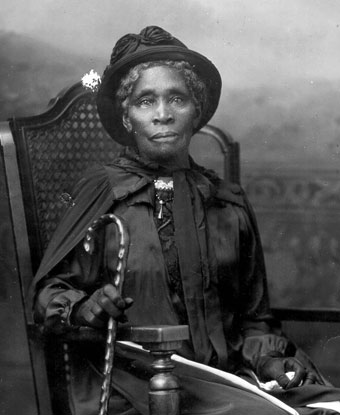Last updated: October 30, 2019
Person
Matilda Burton Murphy Dunbar

Ohio History Connection
The mother of Paul Laurence Dunbar was born enslaved near Shelbyville, Kentucky, to Isaac Burton and Eliza Porter Burton. Her master, Shelbyville landowner David Glass, hired her out as a domestic servant until emancipation in 1865. He gave Matilda the opportunity to gain her freedom by immigrating to Liberia (West Africa), but slavery in the United States ended before her scheduled departure. Around the age of 16, amid the Civil War, she married R. Weeks (or Wilson or Willis) Murphy, who was also enslaved. Together they had two children, Robert and William Murphy. Matilda and R.W. Murphy separated after the war, with Matilda moving to Dayton, Ohio, to live with her mother in the spring of 1866.
In Dayton, Matilda worked as a launderer. There she met Joshua Dunbar, a plasterer. They married on December 24, 1871. Their marriage produced two children, Paul and Elizabeth Dunbar; Elizabeth died before her third birthday. As an enslaved child, Matilda had few educational opportunities. She wanted better for her children and attempted to show them the importance of education by enrolling in night classes at the tenth district school on Zieger Street while spending her days washing clothes, cooking, and sewing for Dayton residents. Matilda’s literacy was such that she taught Paul the basics of reading before he entered elementary school (though she did not teach her other sons).
Matilda’s life was connected closely with that of Paul. She and Paul rarely left each other’s presence; Matilda even moved to Washington, D.C., to live with him after his marriage to Alice Moore. After his separation from Alice in 1902, Matilda and Paul briefly moved to Chicago. In 1903, they returned to Dayton and, in 1904, purchased a house on North Summit Street on the city’s west side in a neighborhood that was overwhelmingly white. Paul wrote from this house until his death from tuberculosis in 1906. Matilda – commonly known as “Mother Dunbar” – lived in the Summit Street house, financially supported by relatives and neighbors, until her death on February 24, 1934. She is buried at Dayton’s Woodland Cemetery. Matilda gained a reputation as a gracious, well-spoken hostess who welcomed those interested in the writings of her son to her home. She maintained Paul’s library and study in their 1906 conditions and showed his work spaces to visitors. The Ohio State Archaeological and Historical Society (today the Ohio Historical Society) acquired the house after her death and formally opened it as a museum in 1938; the Paul Laurence Dunbar State Memorial became part of Dayton Aviation Heritage National Historical Park in 1992.
